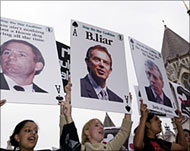Blair on course for third term
British Prime Minister Tony Blair looks on track to win a third straight term in power, as Britain prepares to vote in a general election that has repeatedly called his integrity over Iraq into question.

A trio of new opinion polls forecast Blair’s Labour Party would triumph again at the polling stations on Thursday, although most likely with a smaller share of the vote than in the 2001 election.
With the surveys also showing as much as a quarter of the electorate still undecided, the big question is not whether Blair will be re-elected, but by what margin.
Many voters, furious at Blair for backing the US-led invasion of Iraq in March 2003, could either boycott the polls or opt for the anti-war Liberal Democrats, potentially robbing Labour of a convincing landslide win.
Blair, who turns 52 on Friday, issued a final rallying cry on election eve, reiterating a warning – discounted by many independent experts – that a low turnout will hand the main opposition Conservative Party an upset victory.
Iraq war
“This is a tough and tight race,” Blair said in an impassioned speech in Yorkshire, northern England, warning that anti-Labour protest votes could “let in a Conservative PM”.
|
“This is a tough and tight race. Keep that back door locked. We don’t want the Tories (Conservatives) in by the front or back door” Tony Blair, |
“Keep that back door locked. We don’t want the Tories (Conservatives) in by the front or back door,” he said.
Conservative leader Michael Howard, 63, and Liberal Democrat chief Charles Kennedy, 45, were also out on Wednesday blitzing constituencies up and down the country where tight races could determine the outcome.
Howard remained defiantly upbeat despite the polls. “We are working towards winning tomorrow,” he insisted.
Kennedy, meanwhile, whose smaller Liberal Democrats have won support as the only main party to oppose the Iraq war, predicted they would make their best showing ever.
Blair steered Labour to landslide victories in May 1997 and June 2001, scoring a record 166-seat majority in parliament with 40.7% of the vote in the latter election.
Opinion polls
But that was before he decided to join US President George Bush in invading Iraq in March 2003, despite popular opposition that at one point saw more than one million anti-war protesters on the streets of London.
Nagging questions about the legality of the war, and how soon Blair decided to take Britain into it before telling the public, have foiled Labour’s bid to put the strong economy at the heart of its campaign.
|
|
|
Michael Howard’s Conservatives |
According to a survey to be printed in Thursday’s edition of The Times newspaper, Labour will gain just under 38% of the vote, well down from 2001.
But the poll also predicted that the Conservatives’ share of the vote is likely to drop below even the 31.7% they scored in 2001, a figure seen at the time as a disaster.
Two other polls to be published on Thursday also gave Labour a lead, with The Guardian predicting a massive 130-seat parliamentary majority for Blair.
In contrast, The Independent put the Labour lead at only three percentage points, although it also noted that more than a quarter of the electorate had yet to make up their minds.
Labour Party
Many analysts say if Labour gets less than a 100-seat majority in the 646-seat House of Commons, Blair is likely to make way sooner for Gordon Brown, his ambitious and some say more popular, chancellor of the exchequer.
 |
|
The Iraq war has proven |
The most difficult scenario for analysts is a hung parliament, in which Labour would not have a clear majority. In that instance, it would have to depend on the goodwill of smaller parties to govern.
On the other hand, victory for Labour would mark the first time that the once-socialist, now more centrist party has won three elections in a row since its founding in 1900.
“The last election [in 2001] was a done-deal election with no real expectation of anything else and no real bitter issue,” said Colin Rallings of the elections centre at Plymouth University, southwest England.
“There is still a feeling this will be a done deal, but not to the same degree,” he said.
